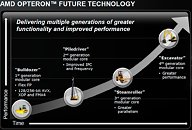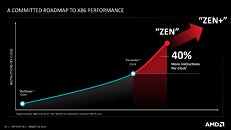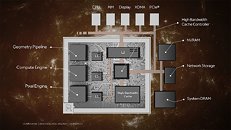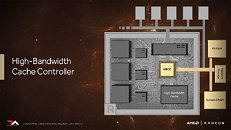Sunday, January 8th 2017

AMD Says "ZEN" CPU Architecture is Expected to Last 4 Years
After spending almost 4 years developing and perfecting (as much as can be perfected in such an amount of time) it's ZEN CPU architecture, AMD is looking to extract some mileage out of it. Mark Papermaster, AMD's chief technology officer, confirmed the four-year lifespan in a conversation with PC World at CES 2017 in Las Vegas, though he declined to discuss specifics. When asked how long ZEN would last (especially comparing to Intel's now-failing two-year tick-tock cadence, Papermaster confirmed the four-year lifespan: "We're not going tick-tock," he said. "ZEN is going to be tock, tock, tock."Intel's tick-tock cadence has typically meant that it develops a new micro-architecture every two years (tock), with a process improvement in-between architectures (the tick). Of these, Kaby Lake is the first exception, ushering in a second "tick" moment for the company, which leveraged what it calls its "14 nm +" manufacturing process. AMD, on the other hand, has typically drawn more than 4 years worth of products from most of its micro-architectures (even Bulldozer has lasted from late 2011 until now), with AMD focusing in incremental updates in-between major architecture launches (such as Bulldozer's Piledriver, Steamroller, and Excavator updates).On Papermaster's words, it seems AMD is planning to iteratively improve its Ryzen chips through some additional generations - whether at the cadence of their Bulldozer architecture or not, remains to be seen, but it can be expected that that will be the case. What those improvements will be, of course, are for now anyone's guess. But Papermaster also said he's a believer in architecture improvements that go beyond simple manufacturing - something he's previously referred to as "Moore's Law Plus."In interviews, Mark Papermaster referred to this as the industry's failure to achieve Moore's law through transistor shrinking alone - as had been historically the case. Moore's Law Plus means that chipmakers will have to find creative, less-streamlined ways of inching closer to what Moore's Law (in its Intel's David House coating, who predicted that chip performance would double every 18 months) stipulates. According to Papermaster, "It will be ingenuity at the system level to put solutions together. It might be combinations of CPU and GPU, other accelerators, different memory configurations, how they're pieced together - there's room for lots of innovation at the next level."We're actually seeing hints of that with AMD's upcoming VEGA architecture's additions of a High-Bandwidth Cache (HBC) and an High-Bandwidth Cache Controller (HBCC): of which you can have an excellent read right here at TechPowerUp. How this will translate with the CPU side of the equation, and what this means for AMD's ZEN or forthcoming CPU architectures, however, remains to be seen.
Source:
PC World






70 Comments on AMD Says "ZEN" CPU Architecture is Expected to Last 4 Years
It's basically equivalent to if Intel had gone Bloomfield to Sandy Bridge to Haswell to Skylake. Those type of improvements per gen (or possibly better).
And what you're saying is essentially the same thing I said. Each word, whether it's tick or tock, means one year, so tick-tock is year 1 and 2. Tock-tock is also year 1 and 2. It's not that complicated.
OEMs want annual refreshes. This provides that. Simple as that. Assuming no delays, there will be new releases every year just like Intel; the goals are the only difference.
The biggest change would definitely be transistors,fin FETs are not made like planar, it makes sense to minimise change on that kind of swap to increase the use and quality of simulations and prior validation data going forward, then since that point AMD were not competing much in the high end , Intel blew several rnd budgets on mobile spec devices and I don't mean just CPUs but associated mobile tech like modems.
But yes, I too would like gargantuan IGP-less parts rated for a million watts, coupled with a follow up to Skulltrail. Or an EVGA SR-3...
Now in a couple of years when/if VR and the IoT revolution truly happens, we probably need as mich oomph as we can get our hands on. Maybe even homeservers will be a thing and everything we have will essentially be glorified terminals. That is not an unattractive thought actually.
Have cell phones gotten 25% better every year? TVs? Cars? Refrigerators?
No? A new one still costs as much as a new one did 5 years ago, right?
Quit acting so entitled. I guarantee you can't create a product and make it 25% better every year indefinitely because nobody can.
Some of us use our pc for more then forum debates and surfing.
Hurry with the Zen I say I'll be on it.